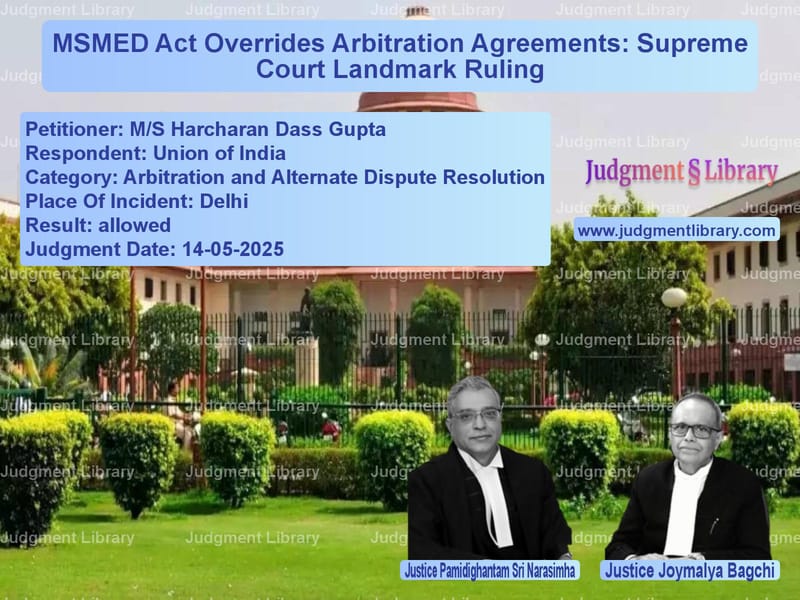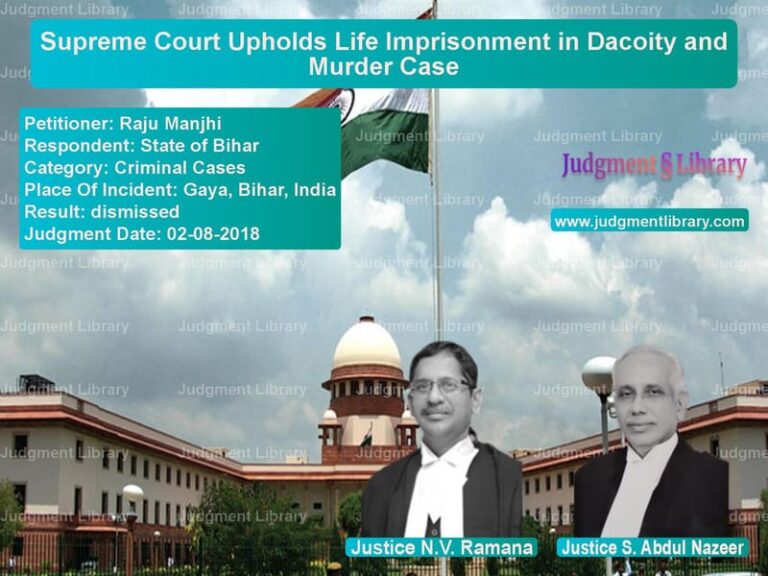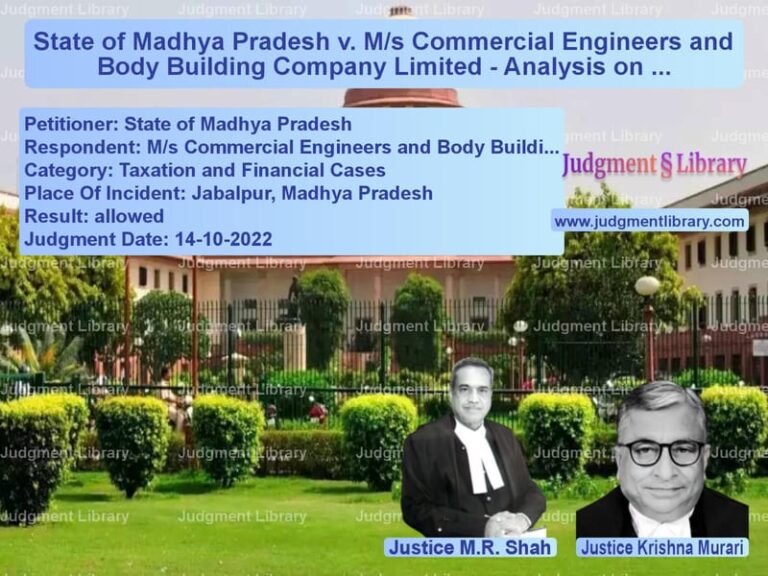MSMED Act Overrides Arbitration Agreements: Supreme Court Landmark Ruling
In a landmark judgment that reinforces the protective framework for Micro, Small and Medium Enterprises (MSMEs), the Supreme Court of India delivered a significant ruling on May 14, 2025, clarifying the hierarchical relationship between the MSMED Act and the Arbitration and Conciliation Act. The case involved a contractual dispute between M/s Harcharan Dass Gupta, an MSME registered supplier, and the Indian Space and Research Organisation (ISRO), highlighting the crucial question of whether statutory protections under the MSMED Act can be overridden by private arbitration agreements between parties.
The dispute originated from a construction project where ISRO, based in Bengaluru, had invited bids for the construction of staff quarters in New Delhi through a tender notice dated January 16, 2017. The appellant, M/s Harcharan Dass Gupta, being a registered supplier under the MSMED Act, was selected for the project, leading to an agreement dated September 11, 2017, for the execution of the work. The contract contained specific clauses – Clauses 25 and 25A – that provided for settlement of disputes through arbitration with the seat of arbitration explicitly designated as Bengaluru.
When disputes arose between the parties during the execution of the project, the appellant invoked the jurisdiction of the Facilitation Council at Delhi under Section 18 of the MSMED Act. The Facilitation Council issued a notice to ISRO on March 30, 2022, for conciliation proceedings. However, ISRO refused to participate in these proceedings. This non-cooperation led to the Facilitation Council taking the inevitable step of referring the dispute to arbitration under Section 18(3) of the MSMED Act. Since the arbitration was to be conducted institutionally through the Delhi Arbitration Centre, the Centre proceeded to appoint a sole arbitrator through a notice dated May 28, 2022.
The arbitral proceedings commenced on June 8, 2022, and on September 26, 2023, the arbitrator took the claim petition on record and directed ISRO to file its statement of defence within four weeks. Instead of complying with this direction, ISRO chose to challenge the very jurisdiction of the Delhi Arbitration Centre by filing a writ petition before the Karnataka High Court under Articles 226 and 227 of the Constitution. The High Court, in its order dated April 22, 2024, allowed ISRO’s writ petition, declaring that the Delhi Arbitration Centre lacked jurisdiction to conduct the arbitration proceedings as it was contrary to the contractual agreement between the parties that specified Bengaluru as the seat of arbitration.
The Legal Battle
The core legal issue before the Supreme Court was whether the statutory mechanism under the MSMED Act could override the contractual agreement between the parties regarding the seat of arbitration. The appellant, represented by Ms. Priya Kumar, learned senior counsel, argued that the MSMED Act, being a special legislation designed to protect the interests of MSMEs, should prevail over the general provisions of the Arbitration and Conciliation Act, 1996. The appellant emphasized that the Facilitation Council in Delhi had proper jurisdiction since the MSME supplier was located in Delhi, and the Council had rightly entrusted the arbitration to the Delhi Arbitration Centre.
The respondent, ISRO, represented by Mr. Vikramjit Banerjee, learned Additional Solicitor General, contended that the contractual agreement between the parties, which explicitly designated Bengaluru as the seat of arbitration, should be honored. They argued that the Delhi Arbitration Centre lacked jurisdiction to conduct the arbitration proceedings as it contravened the specific terms agreed upon by both parties in their contract.
The Supreme Court’s Analysis
The Supreme Court, in its judgment delivered by Justice Pamidighantam Sri Narasimha with Justice Joymalya Bagchi concurring, conducted a thorough analysis of the legal framework governing MSME disputes and arbitration proceedings. The Court began by acknowledging that the issue was “no more res integra” (no longer unexplored) and was squarely covered by its previous decision in Gujarat State Civil Supplies Corporation Ltd. v. Mahakali Foods Put. Ltd. (2023).
The Court extensively quoted from the Mahakali decision, which had clearly established the principle of the MSMED Act’s overriding effect over the Arbitration Act. The Court reproduced the crucial paragraphs from Mahakali that form the foundation of this legal principle:
“42. Thus, the Arbitration Act, 1996 in general governs the law of Arbitration and Conciliation, whereas the MSMED Act, 2006 governs specific nature of disputes arising between specific categories of persons, to be resolved by following a specific process through a specific forum. Ergo, the MSMED Act, 2006 being a special law and the Arbitration Act, 1996 being a general law, the provisions of the MSMED Act would have precedence over or prevail over the Arbitration Act, 1996. In Silpi Industries case [Silpi Industries v. Kerala SRTC, (2021) 18 SCC 790 : 2021 SCC OnLine SC 439] also, this Court had observed while considering the issue with regard to the maintainability and counter-claim in arbitration proceedings initiated as per Section 18(3) of the MSMED Act, 2006 that the MSMED Act, 2006 being a special legislation to protect MSMEs by setting out a statutory mechanism for the payment of interest on delayed payments, the said Act would override the provisions of the Arbitration Act, 1996 which is a general legislation. Even if the Arbitration Act, 1996 is treated as a special law, then also the MSMED Act, 2006 having been enacted subsequently in point of time i.e. in 2006, it would have an overriding effect, more particularly in view of Section 24 of the MSMED Act, 2006 which specifically gives an effect to the provisions of Sections 15 to 23 of the Act over any other law for the time being in force, which would also include the Arbitration Act, 1996.
43. The Court also cannot lose sight of the specific non obstante clauses contained in sub-sections (1) and (4) of Section 18 which have an effect overriding any other law for the time being in force. When the MSMED Act, 2006 was being enacted in 2006, the legislature was aware of its previously enacted Arbitration Act of 1996, and therefore, it is presumed that the legislature had consciously made applicable the provisions of the Arbitration Act, 1996 to the disputes under the MSMED Act, 2006 at a stage when the conciliation process initiated under sub-section (2) of Section 18 of the MSMED Act, 2006 fails and when the Facilitation Council itself takes up the disputes for arbitration or refers it to any institution or centre for such arbitration. It is also significant to note that a deeming legal fiction is created in Section 18(3) by using the expression “as if” for the purpose of treating such arbitration as if it was in pursuance of an arbitration agreement referred to in sub-section (1) of Section 7 of the Arbitration Act, 1996. As held in K. Prabhakaran v. P. Jayarajan [K. Prabhakaran v. P. Jayarajan, (2005) 1 SCC 754 : 2005 SCC (Cri) 451], a legal fiction presupposes the existence of the state of facts which may not exist and then works out the consequences which flow from that state of facts. Thus, considering the overall purpose, objects and scheme of the MSMED Act, 2006 and the unambiguous expressions used therein, this Court has no hesitation in holding that the provisions of Chapter V of the MSMED Act, 2006 have an effect overriding the provisions of the Arbitration Act, 1996.”
The Court further emphasized that even private agreements between parties cannot override statutory provisions under the MSMED Act. Quoting from the Mahakali decision, the Court stated:
“44. The submissions made on behalf of the counsel for the buyers that a conscious omission of the word “agreement” in sub-section (1) of Section 18, which otherwise finds mention in Section 16 of the MSMED Act, 2006 implies that the arbitration agreement independently entered into between the parties as contemplated under Section 7 of the Arbitration Act, 1996 was not intended to be superseded by the provisions contained under Section 18 of the MSMED Act, 2006 also cannot be accepted. A private agreement between the parties cannot obliterate the statutory provisions. Once the statutory mechanism under sub-section (1) of Section 18 is triggered by any party, it would override any other agreement independently entered into between the parties, in view of the non obstante clauses contained in sub-sections (1) and (4) of Section 18. The provisions of Sections 15 to 23 have also overriding effect as contemplated in Section 24 of the MSMED Act, 2006 when anything inconsistent is contained in any other law for the time being in force. It cannot be gainsaid that while interpreting a statute, if two interpretations are possible, the one which enhances the object of the Act should be preferred than the one which would frustrate the object of the Act. If submission made by the learned counsel for the buyers that the party to a dispute covered under the MSMED Act, 2006 cannot avail the remedy available under Section 18(1) of the MSMED Act, 2006 when an independent arbitration agreement between the parties exists is accepted, the very purpose of enacting the MSMED Act, 2006 would get frustrated.
46. The submission therefore that an independent arbitration agreement entered into between the parties under the Arbitration Act, 1996 would prevail over the statutory provisions of the MSMED Act, 2006 cannot be counterunced. As such, sub-section (1) of Section 18 of the MSMED Act, 2006 is an enabling provision which gives the party to a dispute covered under Section 17 thereof, a choice to approach the Facilitation Council, despite an arbitration agreement existing between the parties. Absence of the word “agreement” in the said provision could neither be construed as casus omissus in the statute nor be construed as a preclusion against the party to a dispute covered under Section 17 to approach the Facilitation Council, on the ground that there is an arbitration agreement existing between the parties. In fact, it is a substantial right created in favour of the party under the said provision. It is therefore held that no party to a dispute covered under Section 17 of the MSMED Act, 2006 would be precluded from making a reference to the Facilitation Council under Section 18(1) thereof, merely because there is an arbitration agreement existing between the parties.”
Jurisdictional Framework Under MSMED Act
The Court particularly emphasized the importance of Section 18(4) of the MSMED Act, which specifically vests jurisdiction for arbitration in the Facilitation Council where the supplier is located. The provision states:
“(4) Notwithstanding anything contained in any other law for the time being in force, the Micro and Small Enterprises Facilitation Council or the centre providing alternate dispute resolution services shall have jurisdiction to act as an Arbitrator or Conciliator under this section in a dispute between the supplier located within its jurisdiction and a buyer located anywhere in India.”
This provision, containing a non-obstante clause (“notwithstanding anything contained in any other law”), clearly establishes that the jurisdiction is determined by the location of the MSME supplier, regardless of where the buyer is located or what the contractual agreement might specify.
In the present case, there was no dispute that the appellant-MSME was located in Delhi, and therefore the Facilitation Council in Delhi had proper jurisdiction. The Council had rightfully exercised its power by entrusting the conduct of arbitration to the institutional framework of the Delhi Arbitration Centre.
Court’s Directions and Clarifications
While allowing the appeal and setting aside the Karnataka High Court’s order, the Supreme Court made important clarifications. Mr. Vikramjit Banerjee, learned ASG, had submitted that the Court’s decision should not prejudice any rights or contentions that ISRO might legitimately raise before the arbitral tribunal. The Court readily accepted this submission, clarifying that “we have not touched upon the merits of the matter.” The Court further directed “the learned arbitrator to permit the parties to raise and argue all questions of law and fact as are legally permissible.”
The Court allowed the appeal, set aside the impugned order dated April 22, 2024, passed by the Karnataka High Court, and directed the conduct and conclusion of arbitral proceedings through the Delhi Arbitration Centre.
Implications and Significance
This judgment has far-reaching implications for MSMEs across India. It firmly establishes that the protective framework of the MSMED Act cannot be diluted or overridden by private contractual agreements. The ruling reinforces the legislative intent behind the MSMED Act – to provide a swift and effective dispute resolution mechanism for MSMEs, who often face financial constraints and power imbalances when dealing with larger entities.
The decision clarifies that once an MSME invokes the jurisdiction of the Facilitation Council under Section 18 of the MSMED Act, the statutory mechanism takes precedence over any arbitration agreement that might exist between the parties. The seat of arbitration, in such cases, is determined by the location of the MSME supplier, as explicitly provided in Section 18(4) of the Act, rather than by contractual stipulations.
This judgment serves as a significant protection for MSMEs, ensuring that they can access dispute resolution forums in their own geographical locations, thereby reducing litigation costs and making justice more accessible. It also sends a clear message to larger entities that contractual terms cannot be used to circumvent the statutory protections available to MSMEs under the MSMED Act.
The Supreme Court’s ruling not only resolves the immediate dispute between the parties but also provides much-needed clarity on the hierarchical relationship between the MSMED Act and the Arbitration Act, settling the law on this crucial issue and providing guidance for future cases involving similar legal questions.
Petitioner Name: M/S Harcharan Dass Gupta.Respondent Name: Union of India.Judgment By: Justice Pamidighantam Sri Narasimha, Justice Joymalya Bagchi.Place Of Incident: Delhi.Judgment Date: 14-05-2025.Result: allowed.
Don’t miss out on the full details! Download the complete judgment in PDF format below and gain valuable insights instantly!
Download Judgment: ms-harcharan-dass-g-vs-union-of-india-supreme-court-of-india-judgment-dated-14-05-2025.pdf
Directly Download Judgment: Directly download this Judgment
See all petitions in Arbitration Awards
See all petitions in Commercial Arbitration
See all petitions in Dispute Resolution Mechanisms
See all petitions in Arbitration Act
See all petitions in Institutional Arbitration
See all petitions in Judgment by P.S. Narasimha
See all petitions in Judgment by Joymalya Bagchi
See all petitions in allowed
See all petitions in supreme court of India judgments May 2025
See all petitions in 2025 judgments
See all posts in Arbitration and Alternate Dispute Resolution Category
See all allowed petitions in Arbitration and Alternate Dispute Resolution Category
See all Dismissed petitions in Arbitration and Alternate Dispute Resolution Category
See all partially allowed petitions in Arbitration and Alternate Dispute Resolution Category







